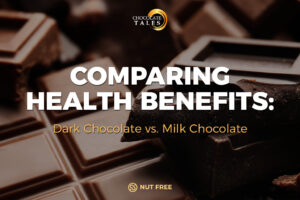In the world of indulgent treats, chocolate reigns supreme. However, not all chocolate varieties are created equal, especially when it comes to their potential health benefits. Dark chocolate and milk chocolate have distinct nutritional profiles that set them apart, making it essential to understand the differences before savouring each delectable chocolate bar.
The Cocoa Connection
The primary distinction between dark chocolate and milk chocolate lies in their cocoa content. Dark chocolate contains a higher percentage of cocoa solids, typically ranging from 50% to 90%, while milk chocolate has a lower cocoa content, often between 10% and 40%. This difference in cocoa levels significantly impacts the nutritional value and potential health benefits of each type of chocolate.
Dark Chocolate Benefits
Dark chocolate is often hailed as a superfood due to its impressive nutritional profile and potential health benefits. Here are some key advantages of indulging in dark chocolate:
Antioxidant powerhouse: Cocoa is rich in antioxidants, particularly flavanols, which have been shown to help combat oxidative stress and reduce the risk of various chronic diseases.
Heart health support: Studies have suggested that the flavanols in dark chocolate may help lower blood pressure, improve blood flow, and reduce the risk of cardiovascular diseases.
Improved cognitive function: Certain compounds in dark chocolate, such as epicatechin, have been linked to enhanced brain function, improved memory, and a reduced risk of cognitive decline.
Mood elevation: Dark chocolate contains tryptophan, a precursor to the feel-good neurotransmitter serotonin, which may help improve mood and reduce symptoms of depression.
Nutritional value: Dark chocolate is a good source of essential minerals like iron, magnesium, and copper, as well as fibre, which can contribute to a balanced diet.
Milk Chocolate: A Sweeter Compromise
While milk chocolate may not pack the same nutritional punch as its dark counterpart, it still offers some potential benefits and a delightful taste experience. Here’s what you need to know about milk chocolate:
Lower cocoa content: Due to its lower cocoa content, milk chocolate contains fewer antioxidants and beneficial compounds compared to dark chocolate.
Added sugars and fats: Milk chocolate often contains added sugars and fats, such as milk solids and vegetable oils, which can contribute to its creamy texture but also increase calorie and sugar intake.
Potential mood boost: Like dark chocolate, milk chocolate contains small amounts of tryptophan, which may have a positive impact on mood and well-being.
Milk Chocolate Nutrition Facts: While not as nutrient-dense as dark chocolate, milk chocolate still provides some essential minerals like calcium, iron, and magnesium, though in lower quantities.
Dark Chocolate vs Milk Chocolate: Making an Informed Choice
When it comes to choosing between dark chocolate and milk chocolate, it ultimately depends on your personal preferences and health goals. If you’re seeking maximum health benefits and a nutrient-rich indulgence, dark chocolate with a higher cocoa percentage (70% or higher) is the way to go. However, you prefer a sweeter, creamier taste and are willing to compromise on some nutritional value. In that case, milk chocolate can still be enjoyed in moderation as part of a balanced diet.
It’s important to remember that moderation is key when consuming any chocolate, as they can be high in calories and sugar. Additionally, pay attention to portion sizes and opt for high-quality chocolate made with minimal additives and preservatives.
Conclusion
In the ongoing debate between dark chocolate vs milk chocolate, it’s clear that dark chocolate emerges as the more nutritious choice due to its higher cocoa content and associated health benefits. However, personal preferences and moderation should ultimately guide your chocolate indulgence. Whether you choose the rich, antioxidant-packed dark chocolate or the creamy, sweet allure of milk chocolate, savour each bite mindfully and embrace the joy of this beloved treat. Remember, chocolate, in its purest form, can be a delightful addition to a balanced and healthy lifestyle.
FAQs
Is it okay to eat chocolate every day?
While chocolate can be part of a healthy diet, it’s best to consume it in moderation and not overindulge on a daily basis. Dark chocolate, with its higher cocoa content, is a better option for daily consumption due to its potential health benefits. However, it’s still important to mind portion sizes and overall calorie and sugar intake.
Can dark chocolate help with weight loss?
Dark chocolate itself is not a weight loss solution, but its high cocoa content and potential to regulate appetite and metabolism may make it a helpful addition to a balanced weight management plan. However, portion control is crucial, as dark chocolate is still a calorie-dense food.
Is it better for children to choose dark chocolate or milk chocolate?
For children, it’s generally recommended to opt for milk chocolate in moderation, as the intense flavour of dark chocolate may be less appealing to their taste preferences. However, exposing children to small amounts of dark chocolate can help develop their palate for less sweet flavours.
Can people with lactose intolerance consume dark chocolate?
Dark chocolate, especially with higher cocoa percentages (above 70%), typically contains very little or no milk, making it a suitable option for individuals with lactose intolerance. However, it’s always advisable to check the ingredient list and opt for dairy-free dark chocolate varieties if necessary.
Are there any potential side effects of consuming too much dark chocolate?
While dark chocolate offers health benefits, consuming excessive amounts can lead to adverse effects. These may include digestive issues, migraines, caffeine sensitivity, and potential interactions with certain medications. As with any food, moderation is key.


